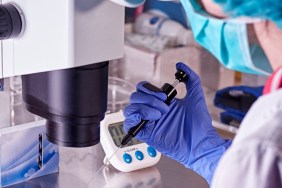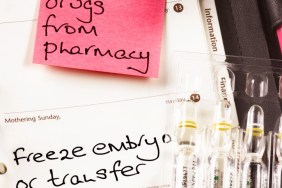I didn’t realize how little I knew about basic biology until I started fertility treatments – forget about knowing the difference between IUI, IVF, Clomid and all the other words I now consider part of my colloquial vocabulary. There are a plenty of things I wish I knew before I started my long journey to pregnancy, all of which were shared by fellow so-called “fertility warriors,” with whom I’ve connected via multiple social media platforms.
The biggest shock to me was that even though I didn’t exactly understand IVF (in vitro fertilization) I assumed it was not only a guarantee of live birth, but that it only took one cycle! While it’s fantastic that women like Janet Jackson are in the news having children in their late 40s and even 50s, without acknowledging that they have likely either used donor eggs or eggs that they had frozen a decade or so before, it can be very misleading. It’s pretty much impossible to get pregnant with your own eggs if you are over 45 and even for those of us more than a decade younger it can take years – and there’s rarely an explanation for why things aren’t working.
On that note, it’s important to remind women not to blame themselves for IVF failures or miscarriages. If things like running or drinking a cup of coffee caused infertility or miscarriages, anyone who didn’t want to be pregnant would just hit the track and have a cappuccino in the morning. We need to stop being so hard on ourselves, especially when it relates to things we can’t control.
To find out more helpful nuggets, here’s a look at what women told me when I asked them what they wish they knew before starting IVF.
“You can’t plan. Covid of course made things worse – my IVF cycle was canceled just before the embryo transfer and I was out thousands of dollars because of the medications – but you’ll be doing a week of shots and then your uterus lining won’t be growing as it should and they’ll cancel the cycle to do an invasive exam to make sure all is O.K., for example. The process really takes over your life. I felt that for years I was either in a cycle or preparing for a cycle meaning I couldn’t travel or plan anything that would have me leaving my hometown.” -Caroline, 29
“It doesn’t work right away unless you’re lucky! Of course many women do get lucky, especially those under 30, but for those of us close to 40 and older it often takes many rounds and the costs add up very fast. I suggest comparing prices at multiple clinics and even multiple cities if that’s possible as the prices can vary greatly. Some clinics will also price match or offer discounts for multiple rounds.” -Summer, 38
“The side effects are rough. I know from speaking with other women that not everyone has a tough time with IVF’s side effects, but I personally had a ton of bloating, lethargy and just overall feeling very emotional. It’s hard to tell how much of this has to do with the process being emotional and how much has to do with the hormones, especially if you’re doing IVF as a single like me. The bloating does goes away a day or two after stopping the medications. The more eggs you get at your IVF retrieval, the more bloated you will be.” -Barbara, 34
“It may never work! It’s hard not to lose hope especially when you’re transferring embryo after embryo and nothing is sticking and no one can give you an explanation.” -Sarah, 31
“You need SO many blood tests! Like every day or every other day for about two weeks. As well as vaginal ultrasounds. Also I didn’t realize once I got pregnant that I would need to keep taking my hormone medications till about week 12.” -Lauren, 42
“Many women get false positives. You’ll test your blood to see if you’re pregnant and it will say ‘yes,’ but then the levels of pregnancy hormones won’t double as they should. This is called a chemical pregnancy. Early miscarriages are also very common, which I didn’t know. They’re usually caused by chromosomal abnormalities. It feels like women who do IVF have more of these, but that’s only because we test so early. Many women have miscarriages and chemicals and just assume they are having late, heavy periods.” -Megan 29
“Clinics in the U.S. need to report their numbers, which basically means it’s public knowledge their levels of success. Because clinics obviously want high levels of success some turn away patients because they’re too old or overweight or are otherwise “challenging.” It’s really wrong and unfair.” -Yael, 37
“You might get one embryo, or 10 embryos, or 30 embryos or even zero embryos. There is no way to predict what will come out of a cycle and just because you had only one embryo your first cycle doesn’t mean you can’t have five good ones the next time you have a retrieval.” -Jennifer, 40
Read More About TTC:








